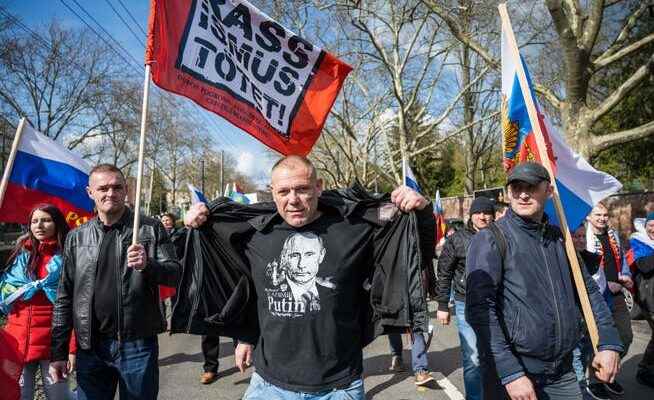The German Bundestag criminalizes the denial and trivialization of major crimes. But that is the wrong way to take action against rabble-rousers and muddleheads.
Putin supporters demonstrate in Frankfurt in April.
«The liberation of Mariupol was a humanitarian action and saved its residents from genocide.» Anyone who publicly asserts this in the future can be liable to prosecution in Germany. The Bundestag has quietly expanded the criminal offense of so-called “incitement to hatred”: It now generally prohibits the approval, denial or trivialization of genocide, crimes against humanity and war crimes. At least when such statements disturb the “public peace”.
This is a drastic and potentially far-reaching change in the law. The German parliament passed them without much debate, almost silently. Both the deputies of the traffic light coalition and those of the CDU/CSU parliamentary group voted for the change. Only the extreme wing parties, Die Linke and AfD, were against it.
Proponents of the law emphasize that it is not a “Lex Putin”, not an instrument for information warfare with Russia. Rather, the legislators are concerned with no longer restricting the criminal offense of “incitement to hatred” to just denying the Holocaust.
The Holocaust as a German taboo
Essentially, it is a response to a societal debate that questions the singularity of the Holocaust. Its representatives want to make this crime comparable with others: the genocide of the Herero and Nama in German West Africa, for example, the Stalinist mass murders, or the extermination of native Americans.
But does expanding the law make sense? From a liberal point of view, even the ban on the “Auschwitz lie” is problematic. It is an encroachment on freedom of expression that clearly contradicts the Anglo-Saxon idea of “freedom of speech”. Unlike Great Britain and the USA, 16 countries in continental Europe, including Switzerland, have passed laws that make denying or trivializing the Holocaust a punishable offence.
These bans are intended to help fight anti-Semitism and prevent reputational damage abroad that would result from public denial or downplaying the murder of the Jews. But in the case of the former “perpetrator nation” there is more at stake.
The Holocaust has become something of a negative founding narrative for the Federal Republic. Their raison d’être is largely derived from the differentiation from this crime and the obligation never to forget the “break in civilisation”. In this sense, the commemoration of the Holocaust is part of the national identity, which is protected by the ban on the “Auschwitz lie”.
Focus on education instead of judges
It is wrong to conclude from this that the dispute over other major crimes should also be placed under judicial control. Because the open society has more effective means against lies and hate speech than courts. Above all, the public debate, which classifies and evaluates events with arguments and counter-arguments. Of course, you won’t be able to convince conspiracy theorists and other muddleheads with that. But constant education immunizes a sufficient part of the public against their poison.
Historical research makes a crucial contribution to this discourse. It is not their task to establish historical truths once and for all. Because new sources and new interpretations change the historical picture. It is not good that German judges are now being forced to separate the sayable from the unspeakable in more and more historical events. The open society’s ability to accept criticism deserves more trust.
